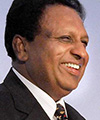All about a change in mindset
T.P. Sreenivasan, Kerala State Higher Education Council Vice Chairman, briefs G. Mahadevan on the councilís achievements, aspirations, and limitations.
How far has Kerala travelled down the RUSA path? There seem to be more roadblocks than opportunities on this front?
You are asking this question on the very day (March 27) on which Kerala’s proposals are being considered by the Project Appraisal Board of Rashtriya Uchchatar Shiksha Abhiyan (RUSA).
Representatives of the Department of Higher Education and Kerala State Higher Education Council (KSHEC) are participating in the discussions.
Though the submission of our proposals was delayed for a year because the work on RUSA was not assigned to KSHEC on time, we worked from the day we were appointed the implementation agency of RUSA and submitted the proposals. Since then, we have been in correspondence with the Ministry of Human Resource Development (MHRD), which has been asking for various data, which were not easy to get. Our plans had to be modified several times because of the new conditions laid down by them.
The proposals are in the final stages and we expect to get an allocation before too long. Most allocations expected are for infrastructure development.
The government decided that only the government colleges and universities would be considered for RUSA funding in the first year. We recently requested aided colleges also to upload their plans, which will be considered for the second year.
The RUSA funding for the preparatory work has been received and it has been placed in a joint account of the department and KSHEC and is being utilised by mutual agreement.
What are the reports generated by the HEC and submitted to the State government and what is their current status? What, in particular, is the status of the report on the police university?
The reports on CBCSS and autonomy have been approved and are in the process of implementation.
The Kerala State Assessment and Accreditation Council (KSAAC) and the faculty academy have been approved and funds allocated, but the necessary structures, including their heads, are yet to be established.
The Cabinet is reported to have approved the police university report.
The other reports are under consideration of the government.
During the tenure of the last LDF government too many such reports were submitted. Not a single one was implemented. Would your reports meet with a similar fate?
As an advisory body, the most that the KSHEC can do is to prepare a blueprint. Our blueprint consisted of infrastructure, teachers training, use of technology, autonomy, research and internationalisation.
Committees were constituted to frame recommendations in these six areas.
As a think thank, the KSHEC has to generate a menu of ideas from which the government can pick and choose. Since the government has priorities and constraints, all our recommendations may not be implemented, as may have happened with the previous council.
In the case of the present council, the modifications to the CBCSS and the Autonomous Colleges Report have been implemented.
The KSAAC, the faculty academy, and the police university have been accepted in principle. Our reports are action-oriented and can be used by the government any time, depending on the needs and availability of funds.
Do you feel that the HEC should acquire or be given more teeth to bring about the kind of reforms suggested by various committees?
As long as the KSHEC remains an advisory body, it cannot act on its own. But the council has responsibilities such as administration of the scholarship, holding of training programmes for teachers and administrative staff, publication of an international journal and commissioning of research studies. We have been performing these tasks.
One way to strengthen the council is to entrust the administration of RUSA to it as envisaged by the MHRD. But the council has been designated only as an implementing agency and the Department of Higher Education has retained all policy and administrative responsibilities.
This needs to be reviewed and the KSHEC should be empowered to deal with RUSA in consultation with the government.
What do you reckon is the signature achievement of the KSHEC under your stewardship? What is the one thing that you would want to achieve before the completion of your term?
The signature achievement of the present council is the creation of awareness to bring about major changes in education, leading to ‘Higher Education 2.0’ we proposed within six months of the formation of the council.
A beginning has been made by the establishment of autonomous colleges, India Semester programmes for foreign students, and teachers training programmes. We also expect that KSAAC and the faculty academy will be in place during the tenure of the present council.
The one thing I would like to achieve is a change in the mindset, which resists all changes. I believe that higher education has changed globally more in the last 10 years than in the previous 100 years. Unless we catch up with these changes and reform the way we teach and learn, we will be unable to prepare our younger generation to make use of the opportunities and meet the challenges of the 21st century, including the demographic dividend we will have as the nation with the largest young workforce in the world.
‘Higher education has changed globally more in the last 10 years than in the previous 100 years.’
